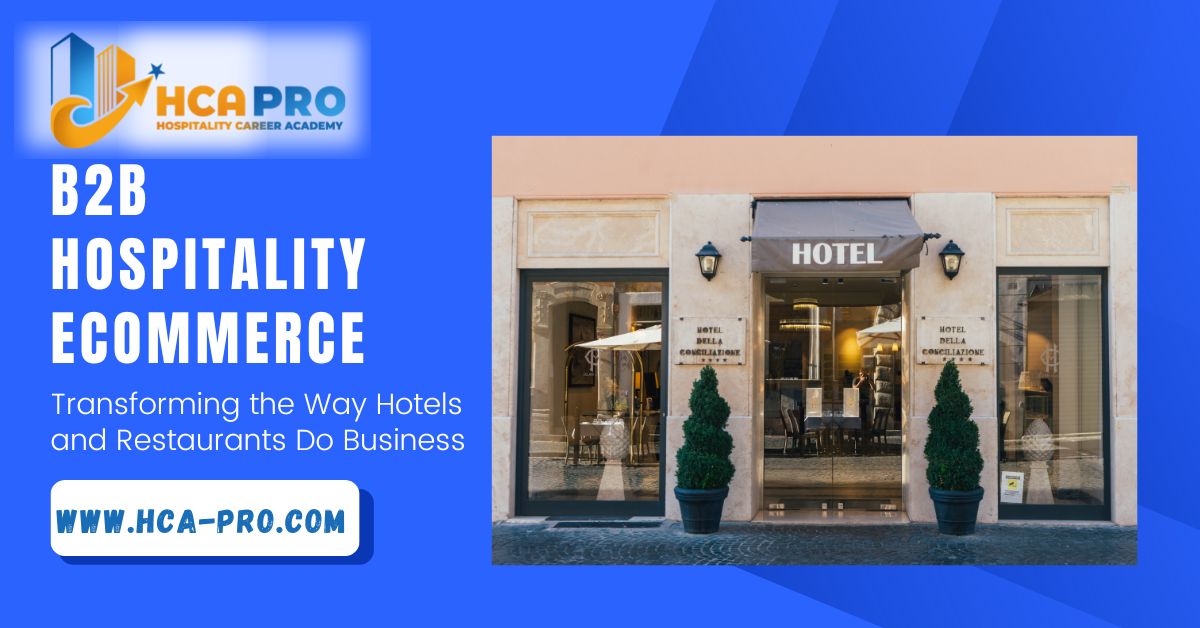
B2B Hospitality Ecommerce: Transforming the Way Hotels and Restaurants Do Business
The hospitality industry is constantly evolving, and the advent of B2B ecommerce has brought about a significant change in the way hotels and restaurants purchase goods and services. Business-to-business (B2B) ecommerce refers to the buying and selling of products and services between businesses, rather than between businesses and consumers. In the hospitality industry, this includes the buying and selling of goods and services between hotels, restaurants, and other hospitality-related businesses. B2B ecommerce is revolutionizing the way these businesses operate by providing access to new opportunities, increasing revenue and efficiency while streamlining the purchasing process.
Benefits of B2B Hospitality Ecommerce
The benefits of B2B hospitality e-commerce are many. It allows hotels and restaurants to increase revenue and improve efficiency while streamlining the purchasing process.
The benefits of B2B Hospitality E-commerce include:
-
Increased Revenue: By purchasing goods and services through B2B ecommerce platforms, hotels and restaurants are able to access a wider range of suppliers at competitive prices. This leads to cost savings, which can be passed on to customers in the form of lower prices or used to increase profit margins.
-
Improved Efficiency: B2B ecommerce platforms automate many of the manual processes involved in purchasing, such as order tracking and invoicing. This leads to significant time savings for businesses, allowing them to focus on other areas of their operations.
-
Streamlined Purchasing Process: B2B ecommerce platforms provide a central location for hotels and restaurants to purchase goods and services from multiple suppliers. This eliminates the need to manage multiple relationships and streamlines the purchasing process.
-
Greater Product Selection: B2B ecommerce platforms typically have a wide range of suppliers, from large manufacturers to small independent businesses. This provides hotels and restaurants with access to a wider range of products and services than they would have through traditional purchasing methods.
-
Better Inventory Management: B2B ecommerce platforms allow hotels and restaurants to easily track their inventory levels, reorder products as needed, and avoid stockouts. This can help businesses save money by reducing waste and ensuring that they always have the products they need on hand.
-
Enhanced Data Analysis: B2B ecommerce platforms also provide businesses with valuable data on their purchases. This data can be used to analyze buying patterns, identify areas where cost savings can be made, and make more informed purchasing decisions.
-
Access to new opportunities: B2B ecommerce platforms provide access to new suppliers, products and services that might not be accessible through traditional methods, this will help hotels and restaurants to differentiate themselves from their competitors.
Greater Product Selection
Greater product selection is one of the key benefits of B2B Hospitality Ecommerce. B2B ecommerce platforms typically have a wide range of suppliers, from large manufacturers to small independent businesses. This provides hotels and restaurants with access to a wider range of products and services than they would have through traditional purchasing methods.
Through B2B ecommerce platforms, hotels and restaurants can browse and purchase products and services from multiple suppliers, which allows them to easily compare prices and products from different suppliers. This increased selection can help businesses find unique products that will set them apart from their competitors.
For example, a hotel may be able to find unique furniture and decor for a renovation through a B2B ecommerce platform that they wouldn't have found through traditional purchasing methods.
In addition, B2B ecommerce platforms can provide access to products that are more sustainable and environmentally friendly, this can be a differentiator for hotels and restaurants that want to appeal to eco-conscious customers.
Overall, greater product selection through B2B ecommerce platforms can help hotels and restaurants stand out from their competitors and provide customers with a unique and diverse experience.
Better Inventory Management
Better inventory management is one of the key benefits of B2B Hospitality Ecommerce. Managing inventory is a constant challenge in the hospitality industry, and B2B ecommerce platforms can help hotels and restaurants effectively manage their inventory levels.
B2B ecommerce platforms typically include inventory management features that allow businesses to easily track their inventory levels, reorder products as needed, and avoid stockouts. This can help hotels and restaurants save money by reducing waste and ensuring that they always have the products they need on hand.
For example, a restaurant can use a B2B ecommerce platform to purchase ingredients from multiple suppliers and track their inventory levels in real-time. This ensures that the restaurant always has the ingredients it needs to prepare its menu items, without having to worry about stockouts.
In addition, B2B ecommerce platforms can provide valuable insights on inventory management, such as identifying which products are selling quickly and which products are not moving as well. This helps businesses to make data-driven decisions on inventory and optimize their supply chain.
Enhanced Data Analysis
Enhanced data analysis is one of the key benefits of B2B Hospitality Ecommerce. B2B ecommerce platforms provide businesses with valuable data on their purchases, which can be used to analyze buying patterns, identify areas where cost savings can be made, and make more informed purchasing decisions.
For example, a hotel can use data from a B2B ecommerce platform to analyze its purchasing patterns and identify areas where it can make cost savings. This could include identifying which suppliers are providing the best prices, or which products are being overstocked. This can help the hotel improve its bottom line and make better use of its resources.
In addition, B2B ecommerce platforms can provide insights into customer behavior and preferences, this could help hotels and restaurants to offer a better customer experience, by providing what the customer wants or identifying the customer needs that are not met.
B2B ecommerce platforms also allow for tracking sales and revenue, this could help hotels and restaurants to understand their sales trends and make data-driven decisions on pricing, inventory, and promotions.
How B2B Hospitality Ecommerce Platforms work
B2B Hospitality Ecommerce platforms work by providing a central location for hotels and restaurants to purchase goods and services from multiple suppliers. These platforms typically offer a wide range of suppliers, from large manufacturers to small independent businesses, providing a wide range of products and services. Some of the key features of B2B ecommerce platforms include:
-
Online Marketplace: B2B ecommerce platforms provide a virtual marketplace where hotels and restaurants can browse and purchase products and services from multiple suppliers. This allows businesses to easily compare prices and products from different suppliers.
-
Order Management: B2B ecommerce platforms typically include order management features that allow businesses to place and track orders, view order history, and receive invoices and shipping information.
-
Inventory Management: B2B ecommerce platforms often include inventory management features that allow businesses to easily track their inventory levels, reorder products as needed, and avoid stockouts.
-
Payment and Billing: B2B ecommerce platforms typically include payment and billing features that allow businesses to make payments and view invoices and purchase orders.
-
Customer Service: B2B ecommerce platforms typically offer customer service support to help businesses with any issues or questions they may have.
Case Studies of B2B Hospitality Ecommerce in Action
To better understand the benefits of B2B hospitality ecommerce, let's look at some case studies of how it's being used in action by hotels, restaurants and other businesses in the hospitality industry.
-
A hotel chain uses a B2B ecommerce platform to purchase linens and other supplies from multiple suppliers. This leads to significant cost savings, which are passed on to customers in the form of lower prices. This case study illustrates how B2B ecommerce can help hotels and restaurants access a wider range of suppliers at competitive prices, which can lead to cost savings and increased revenue.
-
A restaurant uses a B2B ecommerce platform to purchase ingredients from local farms and suppliers. This not only saves time and money, but also supports the local community. This case study illustrates how B2B ecommerce can help businesses source products from local suppliers and support their communities.
-
A hotel uses a B2B ecommerce platform to purchase furniture and decor for a renovation. This allows the hotel to access a wide range of suppliers and find unique, high-quality products at competitive prices. This case study illustrates how B2B ecommerce can help hotels and restaurants access a wider range of products and services, which can help them stand out from their competitors.
-
A hotel chain uses a B2B ecommerce platform to purchase energy-efficient lighting and appliances. This allows the hotel to reduce its energy consumption and costs, and also improves its sustainability. This case study illustrates how B2B ecommerce can help hotels and restaurants access products that are more sustainable and environmentally friendly.
-
A Restaurant uses a B2B ecommerce platform to purchase kitchen equipment, this allows the restaurant to get the best prices and also to have a wide range of options to choose from, this case study illustrates how B2B ecommerce can help restaurants access a wide range of equipment and get the best prices for them.
Conclusion
B2B hospitality e-commerce is transforming the way hotels and restaurants purchase goods and services. It provides access to new opportunities, increased revenue, improved efficiency and streamlines the purchasing process. The additional benefits of B2B ecommerce platforms such as greater product selection, better inventory management, and enhanced data analysis, make it even more valuable for hotels and restaurants. It is expected that more and more hotels and restaurants will adopt B2B ecommerce platforms in the future to take advantage of these benefits and stay competitive in the industry.
Read More: E-Commerce In The Hotel Industry: Impact, Advantages, And Future Trends
